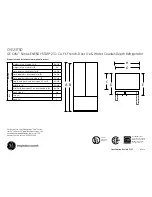
142468
Required tools: socket spanner nr. 8, screwdriver, torx 25.
Caution! After unscrewing of before
fi
xing hinges, hold the door
to prevent it from falling and damaging.
1.
Remove upper hinge cover (save it for eventual later use),
remove also the cover on the opposite side of the upper hinge
cover (on the opposite side you will insert the attached cover
during the assembly), and remove the cover on the opposite
side of the upper part of the door.
2.
Unscrew upper hinge screws and remove the upper door from
the middle hinge.
3.
On the bottom side of the upper door unscrew the swing
stopper screws and remove the stopper (A). Keep this for
eventual use later on. Fix the attached stopper with its
bearing on the opposite side of the door.
4.
Unscrew the forced door closure system (B) and
fi
x it to the
opposite side of the door (certain models only).
5.
Unscrew middle hinge screws, remove the door from bottom
hinge.
6.
Loosen the screws
fi
xing the leg supports (certain models
only), then continue the procedure either under cf. 7 or 7.1,
depending on the model of the appliance.
7.
Tilt the appliance backward (max. 35°) to lean to the rear
side of the cabinet. Unscrew the leg support screws (C) - left
and right, and remove the leg support cover (D) and place it
to the opposite side. Unscrew and remove, then reciprocally
replace the position of end switch (E) and decorative peg (F)
(for models with forced door closing system). Unscrew three
screws
fi
xing the bottom hinge (save the hinge for later use),
and
fi
x the attached bottom hinge on the opposite side.
7.1.
Tilt the appliance backwards (max. 35°) to lean on the
housing at the back.
Loosen three screws holding the bottom hinge (save the
hinge for eventual subsequent door swing change). On the
opposite side af
fi
x the attached bottom hinge. Plug the holes
left after the replacement with relevant pegs.
8.
Repeat the procedure 3 and 4 on the bottom door. In case
there is no bottom door limit peg, transfer the bearing (G) and
washer to the opposite side of the door.
9.
Proceed with the assembly procedure in opposite sequence.
Remark:
• At OLD TIMER appliances (in the model marking …O…)
alteration of door opening direction is not possible.
9
Reverse door swing










































